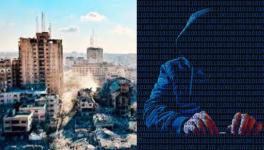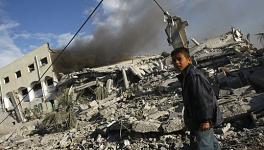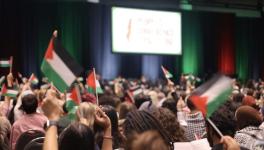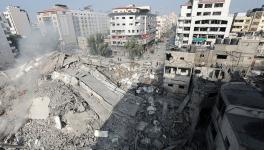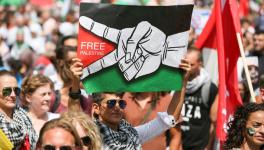Vijay Prashad: The Battle for Aleppo is Over
Vijay Prashad is the George and Martha Kellner Chair in South Asian History and Professor of International Studies at Trinity College. He is the author of twenty books, including The Death of the Nation and the Future of the Arab Revolution (LeftWord and University of California Press, 2016) and co-editor of Land of Blue Helmets: The UN in the Arab World (University of California Press, 2016) as well as editor of Letters to Palestine: Writers Respond to War and Occupation. Vijay is the Chief Editor of LeftWord Books (leftword.com) and is a columnist for Frontline and AlterNet as well as a frequent contributor to The Hindu, Himal and Counterpunch.
Rough Transcript
SHARMINI PERIES: It's The Real News Network. I'm Sharmini Peries coming to you from Baltimore. There are endless reports these days about the imminent defeat of Syrian rebels fighting against the Assad government in the eastern part of Aleppo. The Syrian State says it now controls nearly 75% of the city which has seen its medical infrastructure pulverized in recent months. The news comes as Israeli air strikes are reported to have hit areas in and near Damascus for the second time in a week. Joining us now for an update on the situation is Vijay Prashad. Vijay is the George and Martha Kellner Chair in South Asian History and Professor of International Studies at Trinity College. His latest book is The Death of the Nation and the Future of the Arab Revolution. Thanks for joining us Vijay.
VIJAY PRASHAD: Thanks a lot.
SHARMINI PERIES: Vijay, is the battle over Aleppo nearly at its end? Is Assad expected to declare a victory as the mainstream media is reporting?
VIJAY PRASHAD: Well, let's not talk about victories because it's difficult, Sharmini, to think of victory in this context. You know, several cities have changed hands recently. In Libya, the city of Sirte where ISIS was run out by the militia of the town of Misrata, and in Aleppo now, the Syrian-Arab Army, that is the government of Syria's army has essentially taken Aleppo. But, you know, I think we should ask the question -- what are they taking? These cities have been reduced, at least large parts of them, to rubble. Crucial infrastructure destroyed. The template for this is, in a sense, what the United States did in Fallujah, in the two battles of Fallujah where essentially the city was razed in order to be taken. This was what happened in the city of Kobani in Northern Syria when once again the city was leveled for it to be taken. So, very large parts of Eastern Aleppo have been levelled. There's a very small section where the extremists and various other rebel fighters have been, you know, taking refuge. The indication that the battle is over is that from within that very much surrounded area, messages come asking the government for a five-day cease-fire in order for civilians to leave. This is, I think, a good indication that the battle for Aleppo is over. Obviously, there will be some continued violence. You know, there'll be violence of desperation. There'll be mortar fire from this enclave in East Aleppo into West Aleppo -- that mortar fire, of course, directly into civilian areas. And there's been intensified bombing of this small enclave of opposition fighters in Eastern Aleppo. So, there will be some continued fighting but substantially, I think, all sides now understand that the battle for Aleppo is over.
SHARMINI PERIES: Then, Vijay, who is still remaining in Aleppo? We have seen the sad situation in the social media, a very young girl left behind and families screaming for their loved ones that are still there. Who still remains in the city of Aleppo?
VIJAY PRASHAD: Well, it's very difficult to say. I mean, you know even the numbers -- people throw out numbers, tens of thousands, maybe perhaps more, perhaps less. It's very unclear what is going on inside this enclave. There's very little access for humanitarian workers, people who have come out have various different, you know, statements that they're making. Certainly, I think there's been a great deal of very vicious attacks on this enclave. There's several reasons for that, you know? The first reason is any kind of assault on a city is going to be quite ruthless. And, you know, in a way, I think the West understands this. As I said there was the battle of Fallujah which was very brutal and, you know, dislocated families, destroyed very much of the city. And we will see this again in Mosul where there are a million people inside that city and, you know, even though the Iraqi army backed by the Americans are going relatively slowly, the brutality of that warfare is going to be, I think, quite shocking to people if, indeed, it gets reported. I mean, that's the other side of it. For every story of an atrocity that we get out of Aleppo, is a story that perhaps would not be written, out of Mosul. I think this is something for people to bear in mind. There's a great brutality in fighting to take a city. And I don't think anybody should play that down.
SHARMINI PERIES: Right. Now, Vijay, Russia and the US are negotiating over the fate of the rebel fighters in Aleppo. What are you hearing about those negotiations and what can we expect?
VIJAY PRASHAD: Yes, so, you know, this question of negotiating the exit of fighters is an interesting one. There have been periodically removals of fighters, deals cut, but right now the Syrian government feels that it's in a position of great strength. And its appetite for negotiation is quite low. You know, I talk to people who are involved in some of this stuff and their indication to me quite directly was the reason they were able to go so firmly into Eastern Aleppo, there were two basic, you know, events that took place. One is the Turkish government essentially closed the Azaz border crossing just north of Aleppo, which meant that Turkish proxies were no longer being resupplied from the Turkish border. That meant that they were essentially now isolated. And their exit or their... you know, assistance for them is very hard to come. Secondly, in the south of Syria, in the region of Daraa, where there had been attempt... where the CIA and others were building up a so-called southern front, that entire southern front strategy collapsed earlier this year. Particularly, or sharply, when it was found that sections of the southern front were taking weaponry from the United States from the CIA handlers and others and selling it into the black market. Some of it quite directly to groups such as the Yarmouk Martyrs Brigade which has given its allegiance to ISIS. So, when that southern front essentially deteriorated then the Syrian government was quite confident they could move assets up to Aleppo and, you know, in that sense keep themselves slightly vulnerable from the south because they didn't anticipate any attack from there. So, this confidence of the Syrian government, I think, will mean that they'll be less willing to listen to any kind of a brokered strategy for the removal of the fighters. I think they're in this to win. They are bombing with the ferocity where I think they cede(?) the defeat of the rebels is not a compromise.
SHARMINI PERIES: Right and let's turn to Israel here. Israeli air strikes that took place in Damascus, at least is reported so, and the Israeli Defense Minister Lieberman says that the latest attacks were aimed at disrupting arms shipments to Hezbollah and according to... that was all according to Haaretz. Are there any indications what Israel might do in this situation?
VIJAY PRASHAD: Well, over the course of the last several years, Israel has quite punctually bombed arms convoys that have come in. You know, when planes fly in from Iran, Iran has been using Damascus airport for many years to help resupply Hezbollah in Southern Lebanon. And over the last couple of years, quite punctually Israel has bombed these convoys that have left Damascus Airport towards the Lebanese border or up into the Qalamun Mountains to resupply Hezbollah fighters who've been fighting in Syria, or of course to supply Hezbollah detachments in Southern Lebanon. So, this is exactly what Israel has been doing for a while and I don't think that these bombings have much to do with the assault on Aleppo. I think this is a separate issue. Israel has made it quite clear, I think, in this period that it's come to terms with the new reality in Syria, which is that it seems that there will be no regime change in Damascus. There will be some kind of return of the Assad government to partial sovereignty over sections of Syria. You know, but Syria's a deeply fragmented country now. There's no way to return to 2010. There's no way to return to 1982. This is a very different scenario. It's a highly-fractured country. It's very unlikely that, you know, there'll be any attempt by the Assad government to complete its sovereignty over the country. What is clear, however, and separate from Israel's obsession with Hezbollah, is that the Assad government is keen to take Aleppo so that in quick succession it can pivot and move eastward to Raqqah. One of the things the Damascus governments is quite concerned about is that when the Iraqis take Mosul, ISIS fighters will return to Raqqah. And it's at that point that they fear -- I think with good reason -- that the United States will move into Syria from Mosul and they'll be met perhaps by Turkish military coming across the border and the US and Turks will make an assault on Raqqah. That will, of course, presage the dismemberment of Syria, something this government doesn't want to see. And I think some of the real ferocity in the final stages for Aleppo has been not so much for Aleppo alone, but for the pivot to take Raqqah.
SHARMINI PERIES: Right. Vijay, you might have seen a New York Times article, or editorial actually, penned by Former US Ambassador to Croatia, Peter Galbraith, who says that Washington foreign policy elite has decided to make this very counter-productive move towards arming the rebels and this has been very destructive in Syria. And yet, President-elect, Trump has just appointed Former General James Mattis as Defense Secretary -- we all know that that just means the Secretary of War. How do you think these differences in Washington and, of course, what the new Defense Secretary might do in this situation that they will inherit in about a month?
VIJAY PRASHAD: Well, it's true that what Galbraith talked about, which is the arming of rebels not only in Syria but in Libya, as well, where the example is, I think, much more sharp. You know, this arming has produced, I think, a very great instability. The CIA has found periodically that they've been, in fact, giving arms to people who are very opposed to the American world order, that they are extremists -- I mean in Libya for instance. There's no doubt that in Benghazi at the CIA Annex arms are being provided to groups such as Ansar al-Sharia, etcetera, you know, to fight against Gaddafi. At that time, by the way, Ambassador Chris Stevens was the Liaison from the Obama Administration to these extremist rebels. And it's a very sad thing, of course, that it was these very extremist rebels that most likely killed him a year after the fall of Gaddafi. So, this arming of rebels strategy from the Obama Administration -- which, of course, goes back all the way to the Reagan Administration to the Carter Administration, this idea of the proxy wars that you can fight -- I mean, this has been something that has created catastrophe in this part of the world. And one of the things that I think is very interesting is that the foreign policy elite not only in the United States but in Western Europe, as well, is beginning to understand that that era of American kind of exaggerated power overseas is perhaps coming to an end. In fact, the French Ambassador to the United States, Mr. Araud, had sent out a tweet earlier this year saying that the next President of the Unites States will be the first President who'll preside over a world where the United States is not the first among equals. I think that's quite a suggestive idea. It's true now that there's much more aggressiveness from the Russians and from the Chinese and others. And they're not going to sit by and allow the world order to be formed in the way that the United States has formed it. So, I think that Mr. Trump, regardless of who he appoints -- he seems to want to appoint all Generals to his cabinet, it's more like a junta than a government -- but nonetheless, or whoever he appoints, I doubt very much they'll have the ability to try and shape the world in their image.
SHARMINI PERIES: Alright, Vijay, I thank you so much for this very informative update in such a short period of time. I thank you.
VIJAY PRASHAD: Thanks a lot.
SHARMINI PERIES: And thank you for joining us on The Real News Network.
DISCLAIMER: Please note that transcripts for Real News are typed from a recording of the program. Real News cannot guarantee their complete accuracy.
Courtesy: The Real News Network
Get the latest reports & analysis with people's perspective on Protests, movements & deep analytical videos, discussions of the current affairs in your Telegram app. Subscribe to NewsClick's Telegram channel & get Real-Time updates on stories, as they get published on our website.












